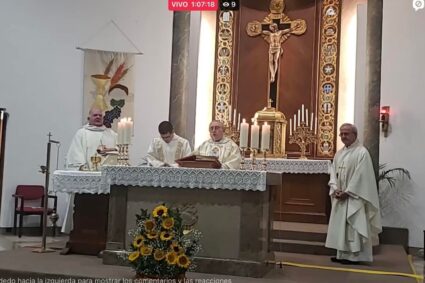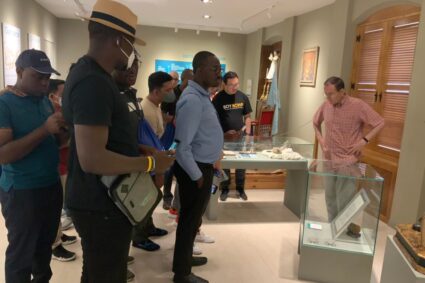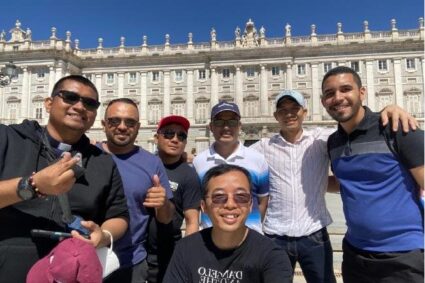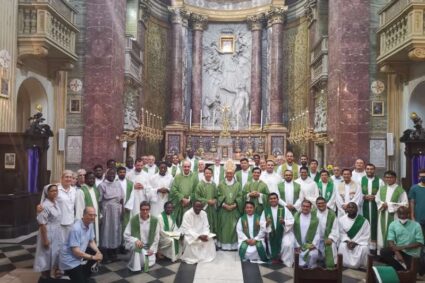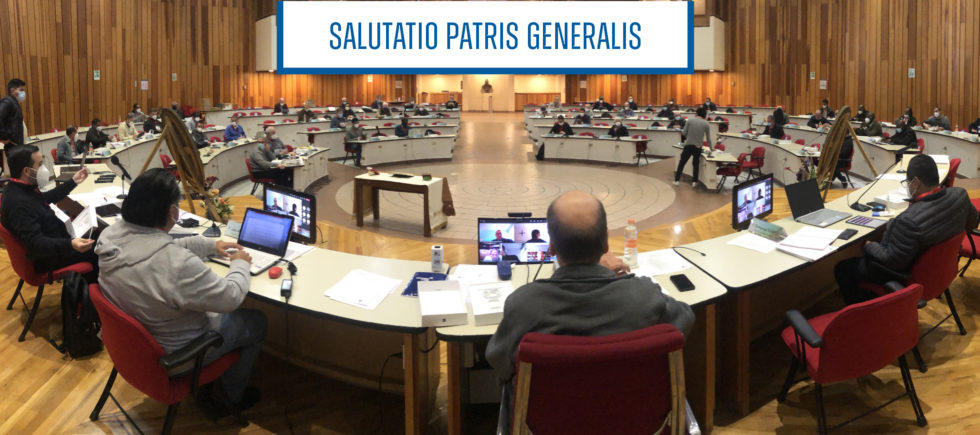
English / Castellano
Over the next few months, we will be receiving, piece by piece, various information and materials relating to the General Chapter of the Order, recently held in Mexico. I would like to dedicate this fraternal letter to share with all of you some first impressions, perhaps in the form of a “disorderly listing” of ideas, options and decisions. Here we go.
The essential gift of the Spirit is Jesus Christ. The Chapter was convened under a most demanding and inspiring motto: “Under the guidance of the Holy Spirit”. Our assembly challenged us with clarity and prophecy: we are called to walk our journey with Christ Jesus, the Lord, at the centre. We are invited to follow Him day by day, and to shape our life according to Him, as a permanent process of Piarist identity of vocation. We are deeply grateful for this, and we wish to bring to all the Pious Schools a renewed call to be witnesses to the Lord, hoping to be credible, because what we proclaim we live with simple and growing authenticity.
Renewing our Calasanctian commitments. Our General Chapter strongly underlined the importance of moving forward on the basis of consolidated Keys of Life, but which demand new responses and offer new nuances. Among these: to continue to build the Pious Schools, which are an instrument of the Kingdom; to care for the faithful living of the vocation received, in order to become the Piarists that children and young people need; to nourish our sending on mission, to incarnate a ministry that is increasingly necessary, so that our way of serving children and young people grows in identity and in capacity of new responses; a Pastoral Care for Vocations based on prayer, on bearing witness, and on an increasingly active commitment to propose, accompany and welcome; an Initial Formation understood in an integral way, capable of accompanying all the dimensions of our vocation; a Community Life understood as a following of the Lord and a humble witness to his centrality; an understanding of our life as a process of growing fidelity, this being the key to our Ongoing Formation: the process; a dynamic of Participation based on the shared construction of a Piarist Christian Community in which the different vocations come together, etc.
Walking along renewed paths. New Keys of Life have appeared, bearing with them challenges and demands, and which become calls that require us to take new steps. We accept the call to synodality as a path of listening, accompaniment, discernment and co-responsibility; we perceive our growing interculturality as a challenge of communion out of diversity and inculturation out of the Gospel; we assume the challenge of the integral sustainability of the Pious Schools, asking the Spirit for the same patience and daring with which Calasanz founded them.
We feel strongly sent to the Mission. We understand well the vision of Calasanz, who insisted, with an integral understanding of Piarist life, that the exercise of ministry itself is a path to fulfilment. We have received the challenging call to walk with young people to build together paths of evangelisation for the children, young people and families who live among us. We assume that the promotion of the Calasanctian identity of all our mission areas must always be a task to be promoted, and always in a shared way with all the people who are co-responsible for the Piarist mission. And we have reaffirmed the call to the mission among the poor, by means of a Pious Schools in Departure and missionary.
A new “photograph” of the Pious Schools: the Spirit encourages us to look at our reality in a renewed way. The “picture” was different: religious chapter members, the Council of the Fraternity and the young people with whom we walk and with whom we deeply share the Mission. It is good to understand that this is so because the Spirit has called us together. And we welcome the newness of this experience as a gift that we must take care of and strengthen. We want the Order and the Fraternity to walk together in all the dynamics with which we build the dream of Calasanz. We want the Youth to be present in the real life of the Pious Schools, and to help us not to believe that we have already given all the answers they need. We want those who have a vocation to share the Piarist Mission to be a real part of the new picture. And we want this to be our way of living and working in all our presences.
Some decisions and changes that are incorporated into our internal legislation. Among them: the challenge of the protection of minors and the fight against sexual abuse, abuse of conscience and abuse of power; the dignity of women; the fight against clericalism; the integral accompaniment of young priests; the clues for a renewed Initial Formation; the development of the Piarist Presence model; the promotion of the Directory of Participation; the value of communities shared between religious and laity; the Piarist ministries; the systematic development of the Pastoral Care of Vocations; greater agility and plurality in the configuration of provincial congregations; the importance of Communication, etc. Each of these changes needs a proper presentation, no doubt; the time will come.
The Spirit has also left us some concerns that we must try to answer. We want to be concerned about the option for the poor, which was what drove Calasanz to engender the Order; we want the challenge of an authentic Piarist living, woven of prayer, work and community, to be always present in our efforts; we want our fight against clericalism and worldliness to be real and committed; we want the Pious Schools to be full of care for the little ones and for the vulnerable, and always on the side of those who suffer; we want the calls we receive from our Church to resound as invitations to conversion and commitment; we want, in short, to live the vocation we have received as an offering to the God of calls.
To walk with the young people: The Chapter invites us to share our dreams; to build together; to accompany in truth; to live our faith in deep openness and communion; to promote new missions with them; to make a synodal journey; to let Calasanz transform them and us, etc. The Chapter invites us to do this because it lived and experienced it. We wish to welcome the three cries pronounced in the 48CG by the group of young people, who affirmed these three convictions inspired by Calasanz and by their lived experience: to be more missionary; to live the realities of young people by promoting their utopia and their projects, discerning their needs in a generous accompaniment; to think again how we live up to the foundation of every pastoral approach: Jesus Christ. Let us truly live from Christ.
The Spirit cannot be controlled. We can try to give names to his inspirations, but others will appear. They will appear in the coming months and years, in the processes of the reception of the Chapter, in the processes of the synodal journey, in the Chapter processes of the demarcations, in the fraternal meetings, even, hopefully, in the meetings of the General Congregation. A Chapter is not an isolated event, but a process of discernment and life.
I am aware that each of these options and decisions needs to be more widely and accurately presented in order to be well understood and received within the Pious Schools. Some of them will be the object of study in future Salutatios. For the moment, I have wanted to offer you an initial, highly concise presentation, which may help to begin the process of reception of the Chapter, which will be a long and active one. To help in that process, I would like to restate three dynamics that I believe help in the process of Chapter reception:
To receive the Chapter, taking a central attitude, out of a conviction that clearly situates us in the present moment of the Order. And that attitude is none other than to try to live and walk with Jesus at the centre of our life, our mission and our options. Only in this way will we be able to welcome this Chapter as an invitation to “build the Pious Schools”. This way of positioning ourselves helps us to understand ourselves as people co-responsibly committed to the construction of an Order that is more alive, more missionary, more faithful and capable of new responses. This commits us all. We invite young people not to repeat our models, but to build with us by contributing their sensitivity. We propose an initial formation that seeks a more meaningful consecrated life, not one without horizons. We work with and for lay people, not so that they may be our collaborators, but so that they may build with us, co-responsibly, in accordance with their own vocation. All this helps us to understand ourselves as humble workers in this most fertile harvest, which belongs to all. We work by vocation.
Purifying our risks and taking advantage of our opportunities. As we receive the Chapter, we all have risks and opportunities. The former must be overcome, the latter seized. Among the first, let me mention a few: the temptation to indifference (this is not for me, it has nothing to do with my daily life and my needs), the temptation to dumbing down (“more papers, as always”), simplification (what matters about the Chapters are the elections, the rest stays on the shelves), manipulation (bring the water to our mill, instead of thinking about what I should change), provincialism (let’s see what we have to do with this Chapter in our Province, instead of thinking about what we are called to, as a Province, with this Chapter), ignorance (not even taking the trouble to read, because I already know everything and I have other more important things to do). There are many examples that we can add, but no need to do so, because the essential thing is to be aware that we all have risks in the reception, because normally things are received according to the receiver, and that is not easy to avoid.
We also have opportunities. It is good that we know how to seize them. As simple suggestions, I would like to point out a few: to enrich our sense of Order, trying to understand what concerns and occupies us, to strengthen and update our understanding of some central elements of our charism about which we can read very interesting documents, to accept a small exercise of displacement in one’s life, thinking about what I can collaborate in order to make possible the great common challenges we have as Pious Schools, to organise a good plan of formation in the community, working on some of the Chapter documents or to have a community retreat centred on what the decisions of the Chapter can mean for us.
Also living this time in a dynamic of prayer. Our communities prayed intensely before and during the General Chapter, asking the Lord that our six-yearly assembly would be an “opportunity of the Spirit.” I think we should not stop doing so. We need to put the reception of the Chapter in the prayer life of our communities and works, as well as in our personal ones. Little by little, like the rain that soaks the earth – if it is constant –, our prayer will transform us according to God’s will. Therefore, I remind you of one of the petitions that are part of the prayer that was prepared for the Chapter.
Come, Holy Spirit. Help us to contemplate life and the world with the eyes of Jesus. Make our humble and faithful disciples of the Lord, like Mary, our Mother, and like Calasanz, our founder. Through their intercession, may the General Chapter of our Order be welcomed and received for the Glory of God and the Benefit of our Neighbour. AMEN.
I end this fraternal letter with a simple story from the Chapter, which I think clearly captures what I want to say in this letter. During the Chapter we had the opportunity to listen to many testimonies by the chapter members themselves, who told us about the projects of the Order, the new presences, etc. One of them was from Fr Roberto Dalusung, from Asia Pacific. I know he will forgive me for mentioning him explicitly. Roberto explained to us the Project of the Piarist Pastoral Care of Vocations in Asia, especially in countries where we are not present. His presentation was a testimony of vocation, in which many of the values we talked about in the work sessions were mixed in. Listening to him we could see what love for the Order and for Calasanz meant, the strength of prayer, the audacity in the proposal, the serene trust in the God of the calls, the learning from the generosity of the young people, the work for the construction of the Pious Schools, the persistent patience of the one who knows that the master of the processes is Another, and many more things that are in the depths of the soul of each Piarist. Perhaps that is why the ovation with which his testimony was received would never end. Thank you, Roberto!
Receive a fraternal embrace
Fr. Pedro Aguado Sch.P.
Father General

Bajo la guía del Espíritu Santo. Primeras intuiciones tras el 48º Capítulo General
English / Castellano
A lo largo de los próximos meses iremos recibiendo, poco a poco, diversas informaciones y materiales propios del Capítulo General de la Orden, recientemente celebrado en México. Quisiera dedicar esta carta fraterna a compartir con todos vosotros unas primeras impresiones, quizá a modo de “enumeración desordenada” de ideas, opciones y decisiones. Vamos allá.
El don esencial del Espíritu es Jesucristo. El Capítulo fue convocado desde un lema muy exigente e inspirador: “Bajo la guía del Espíritu Santo”. Nuestra asamblea nos planteó el reto con claridad y profetismo: somos llamados a caminar desde un único centro, Cristo Jesús, el Señor. Somos invitados a seguirle día a día, y a configurar nuestra vida desde Él, como un proceso permanente de identidad vocacional escolapia. Estamos profundamente agradecidos por ello, y deseamos llevar al conjunto de las Escuelas Pías una renovada llamada a ser testigos del Señor, esperando ser creíbles, porque lo que anunciamos lo vivimos con sencilla y creciente autenticidad.
Renovar nuestras apuestas calasancias. Nuestro Capítulo General subrayó con fuerza la importancia de seguir adelante desde unas Claves de Vida consolidadas, pero que exigen nuevas respuestas y ofrecen nuevos matices. Entre ellas: continuar construyendo las Escuelas Pías, que son un instrumento del Reino; cuidar la vivencia fiel de la vocación recibida, para poder llegar a ser los escolapios que los niños y jóvenes necesitan; alimentar nuestro envío en misión, para encarnar un ministerio que es cada vez más necesario, de modo que nuestro modo de servir a los niños y jóvenes crezca en identidad y en capacidad de nuevas respuestas; una Pastoral Vocacional basada en la oración, en el testimonio, y en el compromiso crecientemente activo para proponer, acompañar y acoger; una Formación Inicial comprendida de modo integral, capaz de acompañar todas las dimensiones de nuestra vocación; una Vida Comunitaria comprendida como seguimiento del Señor y testimonio humilde de su centralidad; una comprensión de nuestra vida como un proceso de creciente fidelidad, siendo ésta la clave de nuestra Formación Permanente: el proceso; una dinámica de Participación basada en la construcción compartida de una Comunidad Cristiana Escolapia en la que confluyan las diversas vocaciones, etc.
Transitar por sendas renovadas. Aparecieron nuevas Claves de Vida, portadoras de retos y desafíos, y que se convierten en llamadas que nos exigen nuevos pasos. Acogemos la llamada a la sinodalidad como un camino de escucha, acompañamiento, discernimiento y corresponsabilidad; percibimos nuestra creciente interculturalidad como un desafío de comunión desde la diversidad y de inculturación desde el Evangelio; asumimos el reto de la sostenibilidad integral de las Escuelas Pías, suplicando del Espíritu la misma paciencia y atrevimiento desde las que Calasanz las fundó.
Nos sentimos fuertemente enviados a la Misión. Comprendemos bien la visión de Calasanz, que desde una comprensión integral de la vida escolapia insistió en que el ejercicio del propio ministerio es camino de plenitud. Hemos recibido la desafiante llamada de caminar con los jóvenes para construir juntos caminos de evangelización para los niños, los jóvenes y las familias que viven entre nosotros. Asumimos que el impulso de la identidad calasancia de todas nuestras plataformas de misión debe ser siempre una tarea que impulsar, y siempre de modo compartido con todas las personas que son corresponsables de la misión escolapia. Y hemos reafirmado la llamada a la misión entre los pobres, desde unas Escuelas Pías en Salida y misioneras.
Una nueva “fotografía” de las Escuelas Pías: el Espíritu nos anima a mirar nuestra realidad de modo renovado. La “foto” era diferente: religiosos capitulares, el Consejo de la Fraternidad y los Jóvenes con los que caminamos y con los que compartimos profundamente la Misión. Es bueno comprender que esto es así porque el Espíritu nos ha convocado. Y acogemos la novedad de esta experiencia como un don que debemos cuidar y potenciar. Queremos que la Orden y la Fraternidad caminemos juntos en todas las dinámicas desde las que construimos el sueño de Calasanz. Queremos que los Jóvenes estén presentes en la vida real de las Escuelas Pías, y nos ayuden a no creer que ya hemos dado todas las respuestas que ellos necesitan. Queremos que las personas que comparten vocacionalmente la Misión Escolapia formen parte -real- de la nueva foto. Y queremos que esta sea nuestra manera de vivir y trabajar en todas nuestras presencias.
Algunas decisiones y cambios que se incorporan a nuestra legislación interna. Entre ellas: el desafío de la protección del menor y la lucha contra los abusos sexuales, de conciencia y de poder; la dignidad de la mujer; la lucha contra el clericalismo; el acompañamiento integral de los sacerdotes jóvenes; las claves de una Formación Inicial renovada; el desarrollo del modelo de Presencia Escolapia; el impulso del directorio de Participación; el valor de las comunidades compartidas entre religiosos y laicos; los ministerios escolapios; el desarrollo sistemático de la Pastoral Vocacional; la mayor agilidad y pluralidad en la configuración de las congregaciones provinciales; la importancia de la Comunicación, etc. Cada uno de estos cambios precisan de una adecuada presentación, sin duda; llegará el momento.
El Espíritu nos ha dejado también inquietudes que debemos tratar de responder. Queremos que nos inquiete la opción por los pobres, que fue lo que impulsó a Calasanz a engendrar la Orden; queremos que el desafío de una vivencia escolapia auténtica, tejida de oración, trabajo y comunidad, esté siempre presente en nuestros esfuerzos; queremos que nuestra lucha contra el clericalismo y la mundanidad sean reales y comprometidas; queremos que las Escuelas Pías estén plenas de cuidado por el menor y por el vulnerable, y siempre del lado de quien sufre; queremos que las llamadas que recibimos desde nuestra Iglesia resuenen como invitaciones a la conversión y al compromiso; queremos, en definitiva, vivir la vocación recibida como ofrenda al Dios de las llamadas.
Caminar con los y las jóvenes: El Capítulo nos invita a compartir los sueños; construir juntos; acompañar en verdad; vivir nuestra fe en profunda apertura y comunión; impulsar con ellos nuevas misiones; hacer camino sinodal; dejar que Calasanz les y nos transforme, etc. El Capítulo nos invita a ello porque lo vivió y lo experimentó. Deseamos acoger los tres gritos pronunciados en el 48CG por el grupo de jóvenes, que afirmaron estas tres convicciones inspiradas en Calasanz y en la experiencia vivida: ser más misioneros; vivir las realidades de los jóvenes promoviendo su utopía y sus proyectos, discerniendo sus necesidades en un acompañamiento generoso; pensar de nuevo cómo vivimos el fondo de todo planteamiento pastoral: Jesucristo. Vivamos, de verdad, desde Cristo.
El Espíritu no se puede controlar. Podemos tratar de dar nombre a sus inspiraciones, pero aparecerán otras. Irán apareciendo en estos meses y años próximos, en los procesos de acogida del Capítulo, en los procesos de camino sinodal, en los procesos capitulares de las demarcaciones, en los encuentros fraternos, incluso, ojalá, en las reuniones de la Congregación General. Un Capítulo no es un evento aislado, sino un proceso de discernimiento y de vida.
Soy consciente de que cada una de estas opciones y decisiones necesita de una más amplia y certera presentación para poder ser bien comprendida y acogida en el seno de las Escuelas Pías. Algunas de ellas serán objeto de estudio en próximas salutatios. Por el momento, he querido ofreceros una presentación inicial, muy sintética, que pueda contribuir a dar comienzo al proceso de recepción del Capítulo, que ha de ser largo y activo. Con el fin de ayudar en ese proceso, me gustaría volver a expresar tres dinamismos que creo que ayudan en el proceso de acogida capitular:
Recibir el Capítulo desde una actitud central, desde una convicción que nos sitúa con claridad en el momento actual de la Orden. Y esa actitud no es otra que tratar de vivir y caminar desde la centralidad de Jesús en nuestra vida, nuestra misión y nuestras opciones. Sólo así podremos acoger este Capítulo como una invitación a “construir Escuelas Pías”. Este modo de situarnos nos ayuda a entendernos a nosotros mismos como personas corresponsablemente comprometidas en la construcción de una Orden más viva, más misionera, más fiel y capaz de nuevas respuestas. Esto nos compromete a todos. Invitamos a los jóvenes no a repetir nuestros modelos, sino a construir con nosotros aportando su sensibilidad. Proponemos una formación inicial buscadora de una vida consagrada más significativa, no de una sin horizontes. Trabajamos con y por los laicos no para que sean sólo nuestros colaboradores, sino para que construyan con nosotros, corresponsablemente, según su propia vocación. Todo ello nos ayuda a comprendernos a nosotros mismos como humildes trabajadores de esta mies fertilísima, que es de todos. Trabajamos por vocación.
Purificar nuestros riesgos y aprovechar nuestras oportunidades. Ante la recepción del Capítulo, todos tenemos riesgos y oportunidades. Los primeros deben ser superados, las segundas aprovechadas. Entre los primeros, cito algunos: la tentación de indiferencia (esto no va conmigo, no tiene que nada que ver con mi vida cotidiana y mis necesidades), la vulgarización (“más papeles, como siempre”), la simplificación (de los capítulos, lo que interesa son las elecciones, lo demás se queda en las estanterías), la manipulación (llevar el agua a nuestro molino, en lugar de pensar en lo que yo debo cambiar), el provincianismo (vamos a ver qué nos cabe de este Capítulo en nuestra Provincia, en vez de pensar a qué somos llamados, como Provincia, desde este Capítulo), la ignorancia (ni siquiera tomarme la molestia de leer, porque ya me lo sé todo y tengo otras cosas más importantes que hacer). Hay muchos ejemplos que podemos añadir, pero no es necesario hacerlo, pues lo esencial es ser conscientes de que todos tenemos riesgos en la acogida, porque normalmente las cosas se reciben según el recipiente, y eso no es fácil de evitar.
También tenemos oportunidades. Es bueno que las sepamos aprovechar. Como sencillas sugerencias, apunto algunas: enriquecer nuestra conciencia de Orden, tratando de entender lo que nos preocupa y ocupa, fortalecer y actualizar nuestra comprensión de algunos elementos centrales de nuestro carisma sobre los que podemos leer documentos bien interesantes, aceptar un pequeño movimiento de desinstalación vital pensando en qué puedo colaborar para que sean posibles los grandes desafíos comunes que tenemos como Escuelas Pías, organizar un buen plan de formación en la comunidad, trabajando algunos de los documentos capitulares o tener algún retiro de comunidad centrado en lo que puede significar para nosotros las decisiones del capítulo.
Vivir también este tiempo en dinámica de oración. Nuestras comunidades oraron intensamente antes y durante el Capítulo General, pidiendo al Señor que nuestra asamblea sexenal fuera una “oportunidad del Espíritu”. Pienso que no debemos dejar de hacerlo. Necesitamos situar la acogida del Capítulo en la vida de oración de nuestras comunidades y obras, así como en la nuestra personal. Poco a poco, como la luvia que empapa la tierra -si es constante-, nuestra oración nos irá transformando según el querer de Dios. Por eso, os recuerdo una de las peticiones que forman parte de la oración que se preparó para el Capítulo.
Ven, Espíritu Santo. Ayúdanos a contemplar la vida y el mundo con los ojos de Jesús. Haz de nosotros discípulos humildes y fieles del Señor, como María, nuestra Madre, y como Calasanz, nuestro fundador. Que, por su intercesión, el Capítulo General de nuestra Orden se acoja y se reciba para Gloria de Dios y Utilidad del Prójimo. AMÉN.
Termino esta carta fraterna con una sencilla historia vivida en el Capítulo, que creo que ilustra muy bien lo que quiero decir en esta carta. Durante el Capítulo tuvimos la oportunidad de escuchar muchos testimonios de los propios capitulares, que nos hablaban de proyectos de la Orden, de las nuevas presencias, etc. Uno de ellos fue del P. Roberto Dalusung, de Asia Pacífico. Sé que él me perdonará por citarle explícitamente. Roberto nos explicó el proyecto de Pastoral Vocacional Escolapia en Asia, sobre todo en países en los que no estamos presentes. Su presentación fue todo un testimonio vocacional, en el que se mezclaban muchos de los valores de los que hablamos en las sesiones de trabajo. Al escucharle pudimos ver lo que significa el amor por la Orden y por Calasanz, la fuerza de la oración, la audacia en la propuesta, la confianza serena en el Dios de las llamadas, el aprendizaje de la generosidad de los jóvenes, el trabajo por la construcción de las Escuelas Pías, la tesonera paciencia del que sabe que el dueño de los procesos es Otro, y muchas cosas más que están en el fondo del alma de cada escolapio. Tal vez por eso la ovación con la que se acogió su testimonio no terminaba nunca. ¡Gracias, Roberto!
Recibid un abrazo fraterno
P. Pedro Aguado Sch.P.
Padre General



